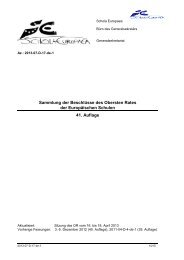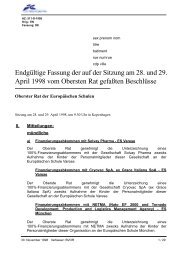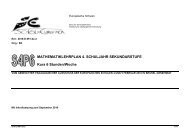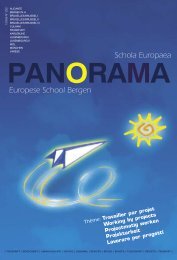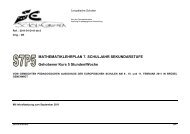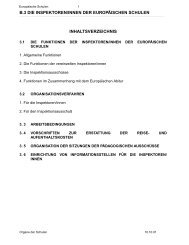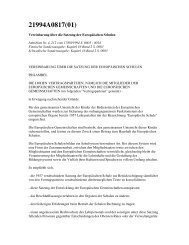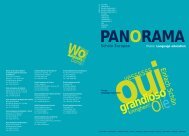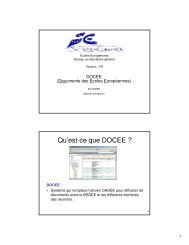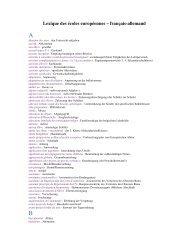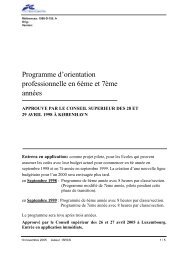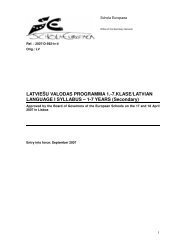External Evaluation of the European Baccalaureate (Annexes)
External Evaluation of the European Baccalaureate (Annexes)
External Evaluation of the European Baccalaureate (Annexes)
Create successful ePaper yourself
Turn your PDF publications into a flip-book with our unique Google optimized e-Paper software.
1.9.4 Doc 1.1<br />
Comparison <strong>of</strong> <strong>the</strong> EB L1 and <strong>the</strong> International <strong>Baccalaureate</strong> Language A2, Higher<br />
Level<br />
Overview<br />
The EB qualification is designed for native speakers working in <strong>the</strong>ir own language. The IB<br />
qualification can be for a ‘native or near native speaker wishing to study a different language<br />
as his or her language A1.’ This means that in <strong>the</strong> IB qualification <strong>the</strong>re is a notional target<br />
language (as <strong>the</strong>re would be in A level Modern Foreign Language study) and that skills and<br />
levels <strong>of</strong> achievement in reading, writing, speaking and listening would probably be judged on<br />
a lower level than those required by native speakers.<br />
The IB qualification is, in effect, a second language qualification, albeit at a high level.<br />
Achieved at high level, it looks to be equivalent to a very good pass in a Modern Foreign<br />
Language A level, possibly slightly higher for someone for whom <strong>the</strong> course has genuinely<br />
been in a foreign language, significantly lower for someone who is <strong>of</strong> near native competence.<br />
Without looking carefully at examination papers and worked outcomes, it is not possible to<br />
judge whe<strong>the</strong>r IB achievement in HL papers is equivalent to that <strong>of</strong> <strong>the</strong> EB.<br />
The aims and objectives <strong>of</strong> both <strong>the</strong> IB and <strong>the</strong> EB are virtually identical. However, <strong>the</strong> IB<br />
specification bears strong resemblance to a GCSE English specification in terms <strong>of</strong> tasks set.<br />
In particular, <strong>the</strong> literary texts suggested are very clearly <strong>the</strong> sorts <strong>of</strong> works that would appear<br />
on a GCSE specification -- straightforward, with plot and character being <strong>the</strong> main areas for<br />
study, not literary technique. Moreover, as in a MFL A level, <strong>the</strong>re is no requirement on<br />
candidates to take <strong>the</strong> ‘literary’ option in <strong>the</strong> examination, though <strong>the</strong>y do have to produce<br />
course work that deals with literature.<br />
Quick comparison <strong>of</strong> IB Language A2 suggests that it might have more in common with EB<br />
Language 2 than with EB Language 1<br />
Principal Differences/ Similarities<br />
In both <strong>the</strong>re is an oral examination.<br />
Candidates in <strong>the</strong> IB are not obliged to have read a play by Shakespeare, nor do <strong>the</strong>y have to<br />
demonstrate knowledge <strong>of</strong> literary texts over time. Both call for study <strong>of</strong> a wide range <strong>of</strong> texts<br />
<strong>of</strong> both literary and non-literary types. In <strong>the</strong> IB literature option, students must choose works<br />
from two genres.<br />
Both EB and IB include ‘cultural options’ which oblige candidates to think about a range <strong>of</strong><br />
texts in a <strong>the</strong>matic way.<br />
The IB does not emphasise Knowledge about Language explicitly, though it is plain from p14<br />
that <strong>the</strong> course will usually include much more ‘language teaching’ than would be expected in<br />
a first language course such as <strong>the</strong> EB: <strong>the</strong> teaching <strong>of</strong> vocabulary, idiomatic expression and<br />
grammatical structures in <strong>the</strong> classroom suggests a notionally lower level <strong>of</strong> understanding<br />
amongst typical IB A2 students. The IB allows <strong>the</strong> possibility <strong>of</strong> study <strong>of</strong> contextual variation,<br />
language change and comparative linguistics, but it is only an option ‘to gain greater<br />
familiarity with <strong>the</strong> target language.’ Again, a term like ‘target language’ suggests that typical<br />
candidates are not native speakers.<br />
137



